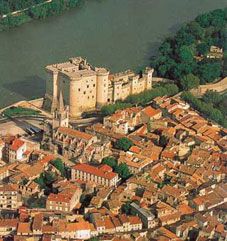Again, under the auspices of
Edward I of England a treaty was fashioned which settled the problem to
the satisfaction of everyone but the Sicilians. On February 12, 1291 at
Tarascon (right) a treaty was signed which tentatively ended the conflict.
In the  treaty, Alfonso III
agreed to release his claim to Sicily, to remove any
support for his brother and to pledge his support to the Holy See. In
exchange, Charles of Valois renounced his claim to Aragon, while the
papacy revoked the donation of Aragon to France and lifted all
ecclesiastical censures against the king and Aragon.
The treaty did not end the conflict, for
James of Sicily had no
intention of giving up the island without a fight, but it did remove
Aragon from a potentially dangerous situation. Unfortunately, Alfonso III
died on June 18, 1291 before the treaty could be fulfilled.
treaty, Alfonso III
agreed to release his claim to Sicily, to remove any
support for his brother and to pledge his support to the Holy See. In
exchange, Charles of Valois renounced his claim to Aragon, while the
papacy revoked the donation of Aragon to France and lifted all
ecclesiastical censures against the king and Aragon.
The treaty did not end the conflict, for
James of Sicily had no
intention of giving up the island without a fight, but it did remove
Aragon from a potentially dangerous situation. Unfortunately, Alfonso III
died on June 18, 1291 before the treaty could be fulfilled.
On news of his brother's death, James named his younger brother Prince Frederick as viceroy of Sicily and then hurried back to Aragon where he was crowned James II of Aragon. James did not feel bound by the previous agreements and proceeded to claim Sicily and the Balearic Islands as inseparable parts of the Crown of Aragon. He then met with Sancho IV of Castile and concluded a peace treaty with him, thus removing one of the threats to Aragon. The pope responded with the now familiar pattern of excommunications for the Sicilians and King James.
James may have thought that he could finesse the situation, but he soon found himself entangled with the Unions and the cortes over the same issues which had bedeviled his late brother. The fact was that while the war had been supported in Catalonia, the clergy and nobility in Valencia and Aragon saw little value in it. Despite the overwhelming successes of the fleet, the outcome was going to be determined by the internal politics of the Crown of Aragon. Moreover, as long James was involved in the war, the unionists could continually use the threat of revolt or foreign intervention to wring concessions from the crown. James II approached the papacy in search of a solution, but in April 1292 Nicolas IV died and the two-year interregnum at the Holy See would delay any potential solution. In the meantime, the war smoldered on. With both sides exhausted materially or financially, the war turned into a series of raids, which left southern Italy and Sicily in turmoil with no appreciable results for either side.


